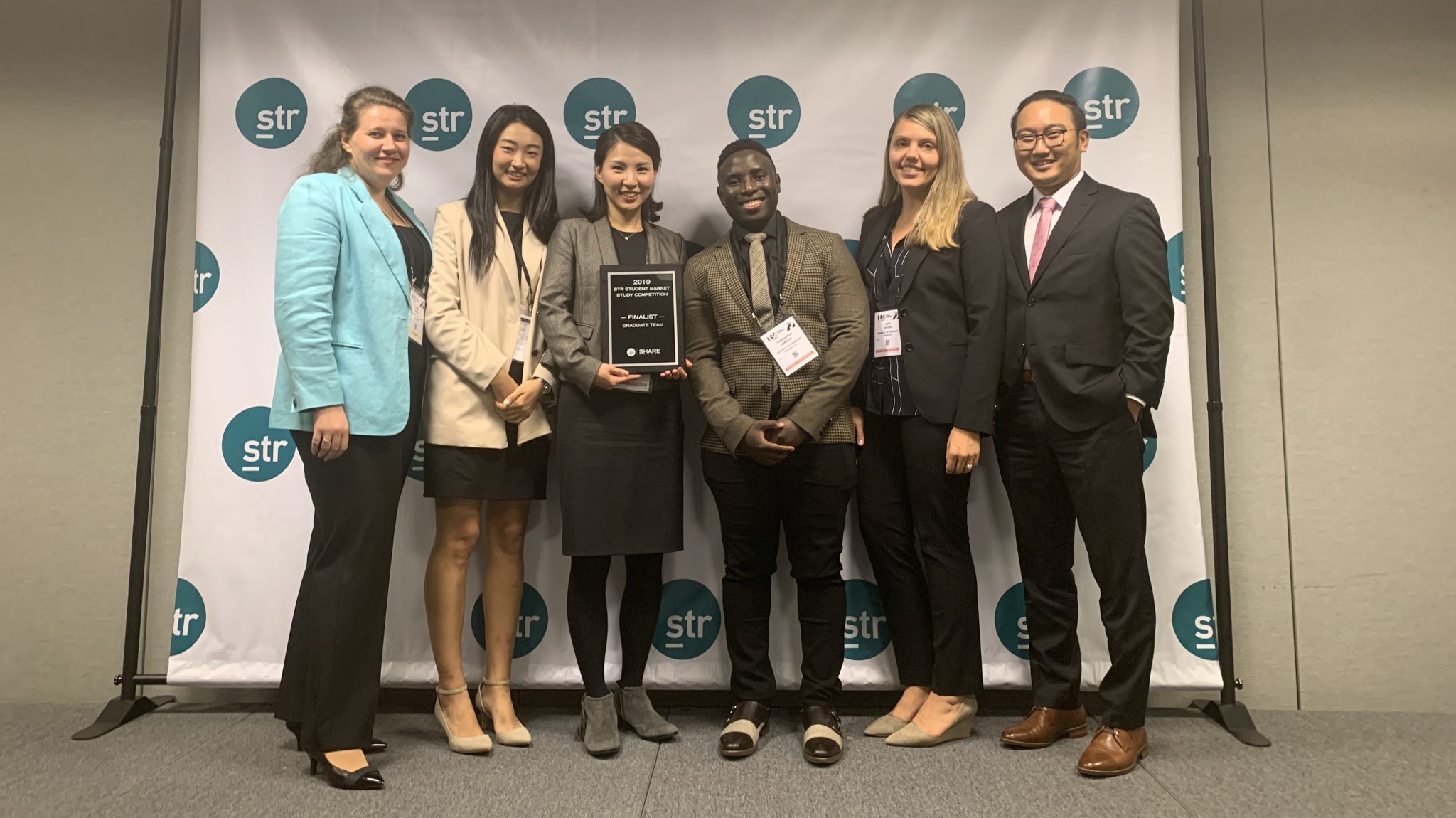
Cindy Choi, assistant professor of nutrition and hospitality management, congratulates hospitality management doctoral students (left to right) Olena Ciftci, of Ukraine; Hayeon Choi, of South Korea; Thamsie Jongile, of South Africa; Inna Soifer, of Russia; and Jangwoo Jo, of South Korea, for being recognized as finalists in the STR Student Market Study Competition in New York in November. Submitted photo
OXFORD, Miss. – Consumer trends in the hospitality industry are constantly shifting. Markets are changing, technology is exploding and the workforce is always fluctuating. Investors rely on industry professionals in hotel industry analytics to make recommendations that account for all these moving targets to maximize their return on investment in this roughly $550 billion industry.
For the first time, a team of hospitality management doctoral students from the University of Mississippi flexed their own hotel industry analytic muscles at the STR Student Market Study Competition at the Hotel Experience, a leading hospitality industry trade show held in New York in November, and returned home finalists.
The team was Hayeon Choi, of South Korea; Thamsie Jongile, of South Africa; Olena Ciftci, of Ukraine; Jangwoo Jo, of South Korea; and Inna Soifer, of Russia.
“Twelve graduate teams and 25 undergraduate teams from top hospitality schools participated in the competition,” said Cindy Choi, assistant professor of hospitality management. “It was a great learning experience for students because they were able to apply the knowledge that they learned in class to the industry and analyze the performance of hotels in a market from the hotel industry perspective.”
The Ole Miss team competed against some of the strongest hospitality programs in the country, including the University of Houston’s Conrad N. Hilton College of Hotel and Restaurant Management, the University of Las Vegas and the University of Central Florida’s Rosen College of Hospitality Management, and placed ahead of the competition’s second- and third-place winners from last year.
STR, a leading provider of analytics and marketplace insights for global hospitality sectors, hosts this annual competition each year. This year, the students selected the San Francisco-San Mateo market to analyze for investors considering new construction or renovations.
The students estimated they each spent 12 hours a week preparing for the competition, beginning in September, each concentrating on areas of the market study that related to their research interests.
Jongile, a second-year doctoral student with research interests in human resources, anticipated questions investors would have about recent area labor strikes and potential labor shortages.
“We had to look beyond the market side – or what the numbers were telling us we could expect going forward – to explain both positives and negatives in the market to potential investors,” Jongile said.
“I followed the track of the strike and realized this unionized industry had a solution. In San Francisco, every time the consumer price index – or the price of basic things – increases, the salary increases in the hospitality industry.”
Soifer was surprised to see how unique San Francisco is in terms of the number of independent hotels, walkability and authenticity.
“We were able to tell a compelling story informed by the city’s distinct appeal to leisure and business travelers,” Soifer said.
Soifer teaches event management to undergraduate students and aspires to be a full-time assistant professor at an R1 university after graduation. She felt the competition contributed to her professional development in hospitality academia.
“If I teach lodging management in the future, I will make sure to incorporate the STR competition into the curriculum,” she said. “I enjoyed the teamwork aspect of the competition. As a Ph.D. student, I usually work on individual projects for my classes, and it was special to be able to team up with my classmates.”
Like Soifer, Jo hopes to pursue teaching and research in hospitality, specifically in the area of data analytics. He found the competition prepared him to take on leadership roles in his future pursuits.
“One of the most critical requisites for leadership is the ability to assess a situation objectively and approach the matter with strategic solutions,” Jo said. “I believe this competition has been a great opportunity to equip and enforce those aspects.”
STR partnered with the American Hotel & Lodging Educational Institute to create the Certification in Hotel Industry Analytics, an industry certification that recognizes the skills and knowledge related to the hotel analytics. Ole Miss students in the NHM 491: Hotel Operations 2 course learn the materials to pass the certification.
Last spring, all the students in the course passed the certification, which can help students prepare for competition, but more importantly, can help students land careers at hotels, in tourism or in travel.
The Department of Nutrition and Hospitality Management offers hospitality management at the undergraduate and graduate level, including a completely online master’s, a traditional master’s and a Ph.D.
The department is part of the School of Applied Sciences, which offers professional preparation programs that integrate academic study, clinical training, creative research, service learning and community outreach, leading to the development of leaders whose professional endeavors will improve health and well-being.